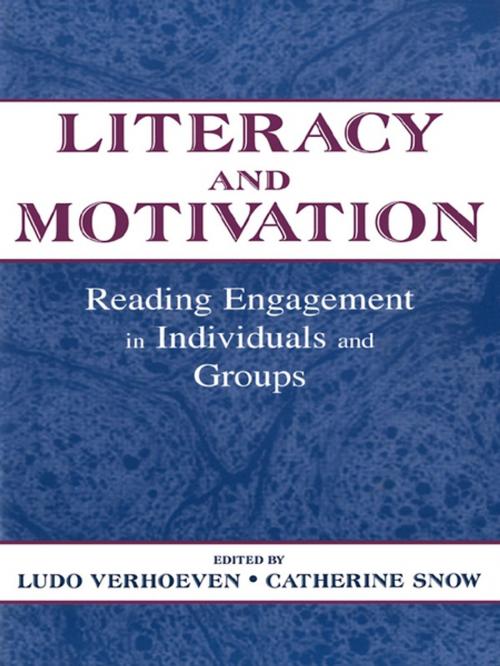Literacy and Motivation
Reading Engagement in individuals and Groups
Nonfiction, Reference & Language, Education & Teaching, Teaching, Teaching Methods| Author: | ISBN: | 9781135670757 | |
| Publisher: | Taylor and Francis | Publication: | March 1, 2001 |
| Imprint: | Routledge | Language: | English |
| Author: | |
| ISBN: | 9781135670757 |
| Publisher: | Taylor and Francis |
| Publication: | March 1, 2001 |
| Imprint: | Routledge |
| Language: | English |
The central question in this volume is how to create a society of "engaged readers" in today's world, where reading is increasingly overruled by other media, such as television and personal computers. Engaged readers, as the term is used in this book, means readers who are socially interactive, strategic, and motivated.
This state-of-the-art review contains research on integrating cognitive, social, and motivational aspects of reading and reading instruction, the chapter authors argue that coming to grips with the notion of engagement in literacy requires redefining literacy itself to acknowledge the degree to which it is not only a cognitive accomplishment, but a social activity and an affective commitment as well. Promoting literacy acquisition thus requires interventions that address attitudes and beliefs as much as those that assure cognitive changes in learners.
Equally important, the authors posit that literacy engagement involves the integration of cognitive strategies and motivational goals during literate activities. This necessary link between literacy and motivation is addressed from a variety of perspectives.
Acknowledging the value of cross-national and cross-cultural comparisons, the book features chapters on the promotion of literacy in different regions around the world.
The central question in this volume is how to create a society of "engaged readers" in today's world, where reading is increasingly overruled by other media, such as television and personal computers. Engaged readers, as the term is used in this book, means readers who are socially interactive, strategic, and motivated.
This state-of-the-art review contains research on integrating cognitive, social, and motivational aspects of reading and reading instruction, the chapter authors argue that coming to grips with the notion of engagement in literacy requires redefining literacy itself to acknowledge the degree to which it is not only a cognitive accomplishment, but a social activity and an affective commitment as well. Promoting literacy acquisition thus requires interventions that address attitudes and beliefs as much as those that assure cognitive changes in learners.
Equally important, the authors posit that literacy engagement involves the integration of cognitive strategies and motivational goals during literate activities. This necessary link between literacy and motivation is addressed from a variety of perspectives.
Acknowledging the value of cross-national and cross-cultural comparisons, the book features chapters on the promotion of literacy in different regions around the world.















